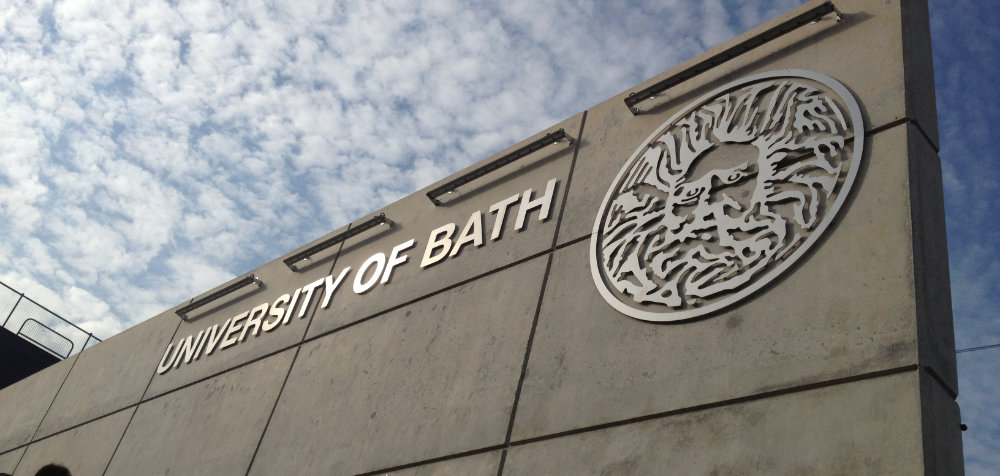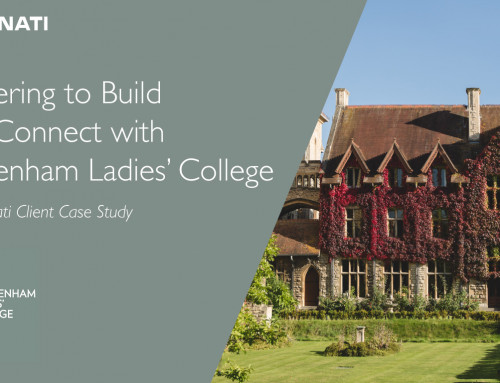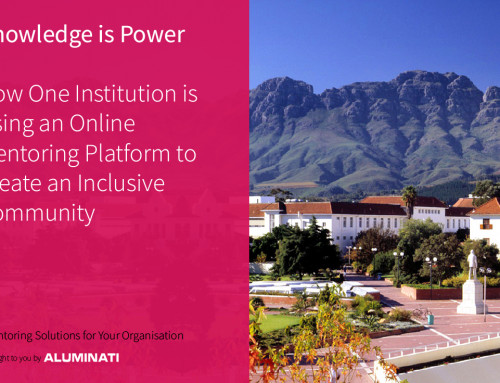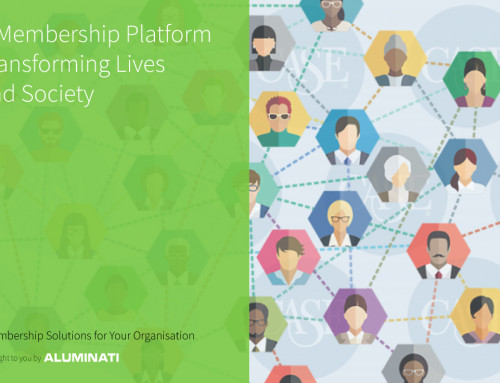Chris Tickell, International Alumni Events Manager at the University of Bath shared the phenomenal success of the programme at one of Aluminati’s Creating Connection virtual roundtables.
Bath’s Ambassador programme was rolled out in 2018 to postgraduate taught international offer holders using the university’s engagement platform (powered by Aluminate), which is also used to run mentoring programmes.
International students at Bath come from 85 countries across the world, with the majority coming from China, Taiwan, Thailand, Japan, and India. Alumni ambassadors on the platform span 46 countries, and are especially important for the university in cities where they don’t usually travel to for academic or recruitment purposes.
The Ambassadors module allows prospective students to connect with graduates from around the world. It also allows them to browse alumni ambassador profiles to see where the qualifications gained might take them.
Chris said: “We started in April 2018, so have had a two-year cycle, and we’ve had huge, huge success with it. We have had over 400 ambassadors enrol, which is great engagement for our alumni”.
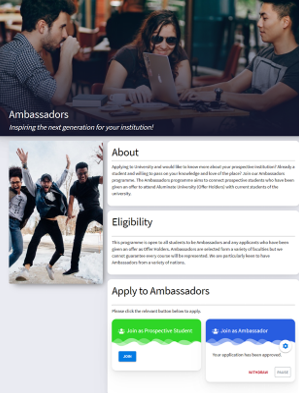 Data collected over the past 2 years has concluded that postgraduate taught international offer holders who access the platform are twice as likely to convert into students of the university.
Data collected over the past 2 years has concluded that postgraduate taught international offer holders who access the platform are twice as likely to convert into students of the university.
“This is a great advert for it, and the results have helped us make the case for continued funding. It has also helped gain support from across the university, with recruitment managers and the admissions team really getting behind this.”
From the programme they found that:
- there is a huge opportunity to engage online
- passive engagement (e.g. viewing ambassador profiles) has a very positive effect beyond conversations
- offer holders like browsing and seeing what the degree can get them
Q&A with Chris Tickell
What does the programme look like?
On the platform, there are different types of interactions: student to alumni as mentees and mentors, alumni to alumni and the ambassador to offer holder relationships. Applicants get a unique link to join the platform integrated into our applicant site (through a Single-Sign-On integration), and once we get confirmation of registered students, we deactivate the access links to the platform for those that did not come to Bath.
No one on the platform can see the offer holder, not even between offer holders. The offer holder profile becomes visible when they contact an ambassador and the ambassador accepts the request. But their profile is only visible to that ambassador and no one else.
What about vetoing ambassadors to participate / safeguarding considerations?
At the beginning, ambassadors would need to apply and be accepted, but now, staff in charge just keep an eye on data and interactions. Bath has never had a problem with an ambassador, as people that volunteer to do this are great advocates of the university.
Maria, Aluminati’s mentoring consultant contributes her experience from working at a leading UK University:
Providing terms and conditions when signing up to be an ambassador on the platform that are also accepted by the applicant is a good way of mitigating any risks.
Would it be possible to be stricter with ambassadors?
Back to Chris: Yes, you can use the account type of a user on the platform to filter who is able to join as an ambassador or potentially run application forms and require approval before they are able to become one.
The platform allows you to create set questions for offer holders, and direct their conversations at ambassadors (avoiding common questions that usually go to the admissions team, for example about immigration requirements, thus saving admin time).
Are the same people mentors and ambassadors?
We target specifically alumni 0-5 years out to be ambassadors, that are yet not mentors themselves, but any alumni is welcome to be an ambassador and can join by turning on their ambassadors feature on the platform.
Was the setup process simple?
Yes, it was fairly easy to set-up, but with staff turnover, priority had shifted down. With the current crisis, it is back up as an essential project.
What are the day-to-day resources required to manage an ambassadors programme?
For the Alumni team, this varies week to week – it can be an hour daily during peak times. For example, now, this is increasingly needed because of the COVID-19 crisis, where we need to generate engagement opportunities with both alumni and offer holders. There are also meetings with the Communications teams to plan campaigns.
The Recruitment team handles most of the offer holder activity. The Alumni team share the data from the platform for them to take actions and analyze. The relationship with Admissions is also very positive.
How to measure impact and conversion rate for offer holders within the ambassadors’ programme?
- Have informal ambassadors go to events and speak to students.
- Calculate the conversion rate for all offer holders vs. the conversion rate for offer holders that were part of the ambassadors’ platform.
- Include offer holders that use the platform that do not have access to any other engagement activity in their cities, and use the online solution as a way of connecting.
- Open up geographical locations that are not easily visited by the Admissions Team. This adds value to the offer holder experience.
- The first cohort of offer holders that participated in the programme graduated in January and will be asked to share their experiences.
Want to find out more about how Aluminate Community Builder can help grow and support your community?
About The Author

Andrej Dethlefsen
Marketing & Communications Officer at Aluminati
He is passionate about education, communications and community.
